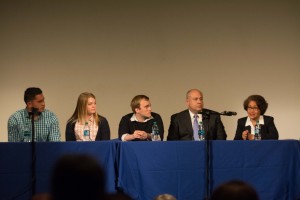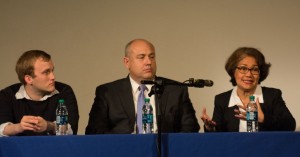
A panel of BYU students and faculty met on Wednesday, March 30 to discuss potential pros and cons of using online textbooks in college courses as an alternative for pricey textbooks.
The cost of textbooks is on the rise, according to BYU enterprise architect Troy Martin. Martin said a recent study showed that the average student spends $1,000 per year on textbooks.
Religion professor John Hilton, who acted as moderator at the textbook panel, said research proved that using Open Educational Resources or online class materials is a “viable solution” to textbook affordability for both students and faculty.
Data provided that the Open Educational Resources’s significantly lower price in comparison to traditional textbooks does not compromise the quality of the content. Students compared the efficacy of online textbooks and traditional textbooks to test this in 12 peer-reviewed studies. Nintey-three percent of the 50,000 students who participated in the studies reported having the same or better outcomes with online textbooks versus traditional textbooks.
Student Advisory Council member Jacob Stoeltzing of the BYU student OER team said the group’s studies of online textbooks have yielded similar results.
“From the research we’ve done, we’ve seen that these materials are good, quality material,” Stoeltzing said.

Panel member and BYU statistics professor Lynne Nielsen was part of a team that began using Open Educational Resources in BYU’s introductory statistics classes three years ago after searching for a more effective and inexpensive textbook to use.
She said student performance has slightly improved following the implementation of the online resources into the courses.
“I’m hoping that more departments on campus will be open to adopting open-source materials so that it will translate to lower textbook costs for students,” Nielsen said.
BYUSA organized the student and faculty textbook affordability panel in hopes of raising awareness about Open Educational Resources at BYU, according to student Open Educational Resources team member Ryan Hernandez.
“We hope that this will help educate the students and faculty to help them become aware of what resources are available,” Hernandez said. “Hopefully it will lead to conversations and decisions that will ultimately help them integrate a system of open educational resources.”




